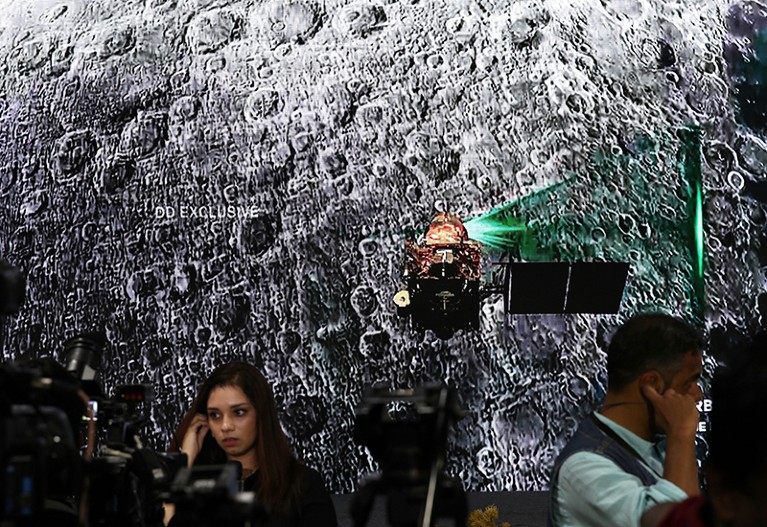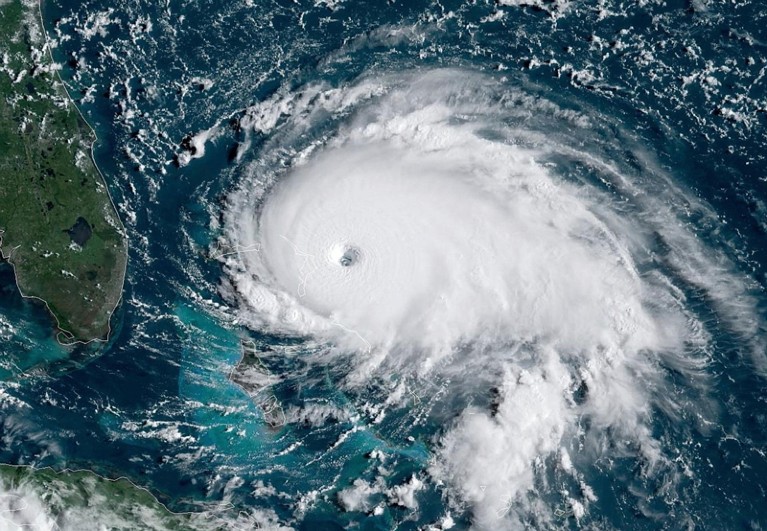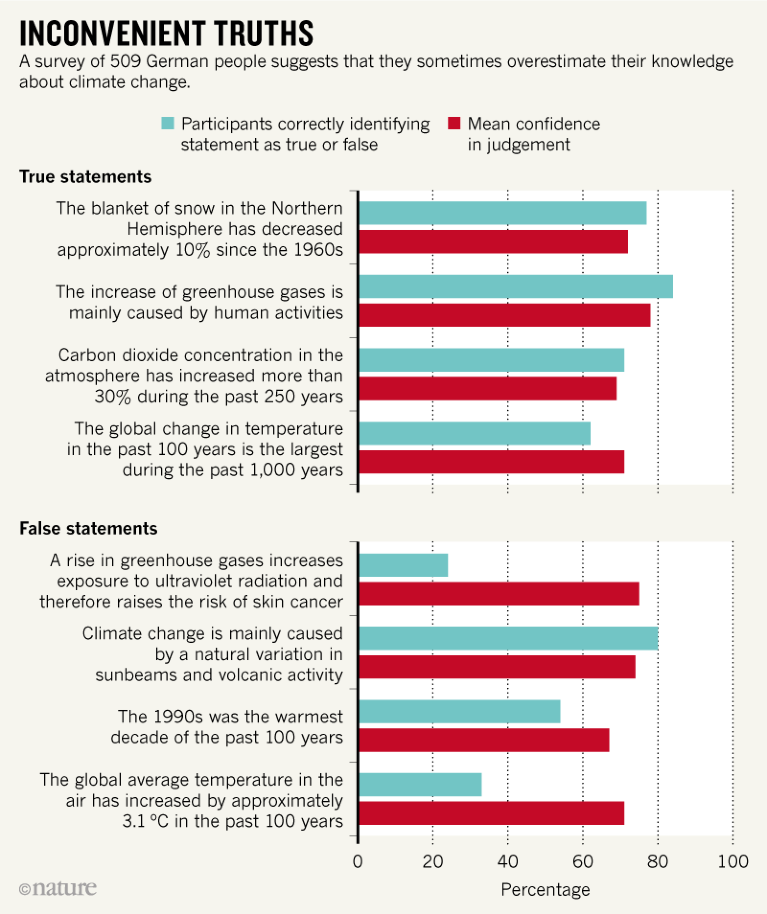SPACE
India loses contact with Moon craft India’s space agency lost contact with its Moon lander during the final few minutes of the craft’s descent early on 7 September, Indian time. The mission was the country’s first attempt to place a craft on the Moon. Mission control at the Indian Space Research Organization tweeted that the descent had gone as planned until the lander, called Vikram, reached 2.1 kilometres above the lunar surface. “Subsequently, communication from Lander to the ground stations was lost,” the tweet said. The Chandrayaan-2 orbiter later located Vikram using its cameras. Efforts to establish contact with the lander continue, said the agency’s chair, Kailasavadivoo Sivan.

The Indian space agency’s tracking and command centre, which lost contact with its Moon lander on 7 September.Credit: Jagadeesh NV/EPA-EFE/Shutterstock
POLITICS
Nuclear activity Iran is preparing to ramp up centrifuge development for uranium enrichment. The move tests a deal made in 2015 in which Iran agreed to curb its nuclear activities in exchange for the lifting of economic sanctions. When the United States pulled out of the deal, known as the Joint Comprehensive Plan of Action, last year, Iran expected Europe to restore its international trade and help it circumvent a US embargo. But a France-led initiative has failed to deliver, Iran’s nuclear chief Ali Akbar Salehi said in a press conference in Tehran with Cornel Feruta, acting head of the International Atomic Energy Agency (IAEA). Iran has said it will continue to allow the IAEA to inspect its nuclear facilities. The IAEA board of governors is meeting in Vienna to decide next steps.
PEOPLE
Science minister The UK science minister, Jo Johnson, resigned from his post and as a Member of Parliament on 5 September — citing conflicts between what he thinks is best for the country and his family ties. Jo Johnson is the younger brother of Conservative Prime Minister Boris Johnson, who has said that the United Kingdom will leave the European Union by a 31 October deadline, even if there is no deal in place to regulate its future relations with the bloc. A no-deal Brexit is widely predicted to be detrimental to science. Jo Johnson, who campaigned for the United Kingdom to stay in the EU in 2016, first held the science minister post from 2015 to 2018, and was well liked by researchers, who have praised his understanding of the sector. He was reappointed in July.
Mayoral race Cédric Villani, a mathematician and member of the French parliament, is to run for election as mayor of Paris. Villani has represented President Emmanuel Macron’s ruling party, La République en Marche! (LREM), in France’s National Assembly since 2017. He will stand as an independent candidate, having missed out on LREM’s nomination. In a speech on 4 September, Villani said that he had spent his research career solving complex problems, and that he entered politics to try to bring more scientific knowledge into government. Ecology would be at the heart of his plans to improve the lives of Paris’s citizens, said Villani, who won the coveted Fields Medal for mathematics in 2010. Mayoral elections will be held next March.
Data pioneer Donald Lindberg, who oversaw the creation of the biomedical database PubMed, died on 17 August, aged 85. Lindberg was the director of the US National Library of Medicine (NLM) — the world’s largest biomedical library — for more than 30 years. As director, he digitized the library’s holdings and established systems for providing biomedical-research articles, clinical-trial results, genomic data and other medical information to researchers, doctors and patients around the world. The library’s online tools, including PubMed and ClinicalTrials.gov, have become staples of biomedical research. Lindberg, who originally trained as a pathologist, left a faculty position at the University of Missouri in Columbia to become NLM director in 1984. He retired from the library in March 2015, but continued to serve as its director emeritus.
EVENTS
Catastrophic storm Hurricane Dorian made landfall in the Bahamas on 1 September as a category-5 storm, devastating the islands and matching or breaking weather records. The storm tied for the second-strongest hurricane to make landfall — as judged by wind speed — ever recorded in the Atlantic. It also intensified at an unprecedented rate for a storm this strong, increasing its peak wind speed from 240 to 298 kilometres per hour in 9 hours. The hurricane (pictured) pounded the Bahamas for 40 hours, severely damaging or destroying about 45% of the homes on 2 of the nation’s northernmost islands with 300-kilometre-per-hour winds and a 5-metre storm surge. As of 10 September, at least 50 people had died in the Bahamas. After thrashing the island nation, Dorian crawled north along the US east coast, spawning tornadoes and floods, before making landfall in North Carolina as a category-1 hurricane on 6 September.

Credit: NOAA/Planetpix/Alamy
Epstein fallout Joichi Ito, the director of the Massachusetts Institute of Technology (MIT) Media Lab in Cambridge, resigned on 7 September because of his interactions with sex offender and alleged sex trafficker Jeffrey Epstein. The same day, MIT president Rafael Reif said that he had asked the university’s general counsel to hire an outside law firm to conduct “an immediate, thorough and independent” investigation of MIT’s dealings with Epstein, a financier who died in August. Reif cited “deeply disturbing allegations” published by The New Yorker, which reported on 6 September that Media Lab staff had concealed donations from Epstein. Nature was unable to reach Ito for comment; last month, he publicly apologized for accepting money from Epstein’s foundations for the lab and for technology investment funds that he runs.
RESEARCH
Baffling illness A lung illness linked to e-cigarette use has killed 5 people and potentially affected 450 others in 33 US states and one territory, said the Centers for Disease Control and Prevention on 6 September. The symptoms include nausea, fever and difficulty breathing, and cases began surfacing earlier this year. Public-health officials haven’t been able to identify a specific device, product or substance common to all cases, but they suspect that an inhaled chemical is responsible. In a study of ill teenagers and young adults in Wisconsin, published on 6 September in the New England Journal of Medicine, 84% reported vaping substances containing tetrahydrocannabinol — the main psychoactive chemical responsible for marijuana’s ‘high’ — although others reported using only nicotine products (J. E. Layden et al. N. Engl. J. Med. http://doi.org/c99f; 2019).
AWARDS
Breakthrough prizes The Event Horizon Telescope team has been awarded one of this year’s US$3-million Breakthrough prizes for taking the first direct image of a black hole and its event horizon. The picture, unveiled in April, shows the supermassive black hole at the centre of the galaxy Messier 87. The prize will be shared equally between the collaboration’s 347 members, and will be awarded in a ceremony at NASA’s Ames Research Center in Mountain View, California, on 3 November, along with four Breakthrough prizes in the life sciences and one in mathematics. Russian–Israeli billionaire Yuri Milner launched the Breakthrough prizes in 2012; the awards are now sponsored by him and other Internet entrepreneurs, including Facebook chief Mark Zuckerberg and Google’s Sergey Brin.
TREND WATCH
A study of people in Germany suggests that they have a reasonably good grasp of the science surrounding climate change, but occasionally overestimate — or underestimate — their understanding. Psychologists showed 8 scientific statements about climate change to a group of 509 citizens, and asked them whether the statements were true or false. Participants were then asked how certain they were that their answer was correct, on a scale from mere guesswork (50%) to absolute certainty (100%). Most of the participants correctly identified true statements, and were fairly confident that their judgements were correct. But people weren’t as good at identifying statements that were false, despite being just as confident in their answers. For comparison, the study team asked 207 German climate-change researchers to verify the same set of statements. On average, the scientists responded with both greater accuracy and more confidence in their knowledge than citizens. The study team was keen to base the research in Germany, where the social justice of pricing carbon emissions from cars and buildings has generated heated debate.

Source: H. Fischer et al. Nature Clim. Change http://doi.org/dbbn (2019).



